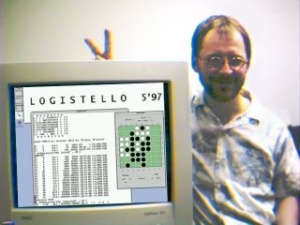Michael Buro

Michael Buro,
a German computer scientist, AI-researcher, and professor at the Department of Computing Science at University of Alberta. Michael Buro is creator of the ProbCut selective extension of the alpha-beta algorithm, applied to his Othello program Logistello [2] as part of his Ph.D. thesis at Paderborn University [3]. In 1997, Logistello won 6-0 from the then Othello World champion Takeshi Murakami [4] [5] [6].
Contents
GLEM
Michael Buro's General Linear Evaluation Model (GLEM), introduced at the Computer and Games 1998 conference in Tsukuba, Japan [7], also applied to Othello, covers not only automated tuning quite similar to Texel's Tuning Method which popularized logistic regression tuning in computer chess some years later, but further provides a procedure for exploring the feature space able to discover new evaluation features in a computational feasible way.
Selected Publication
1990 ...
- Michael Buro (1990). A contribution to the determination of Rado's Sigma - or - How to catch busy beavers? Diploma thesis, RWTH Aachen (German) [11] [12]
- Michael Buro (1993). On the Maximum Length of Huffman Codes. Information Processing Letters, Vol. 45
- Michael Buro (1994). Techniken für die Bewertung von Spielsituationen anhand von Beispielen. Ph.D. thesis. Paderborn University (German)
1995 ...
- Michael Buro (1995). Statistical Feature Combination for the Evaluation of Game Positions. JAIR, Vol. 3
- Michael Buro (1995). ProbCut: An Effective Selective Extension of the Alpha-Beta Algorithm. ICCA Journal, Vol 18, No. 2, pdf
- Michael Buro (1997). An Evaluation Function for Othello Based on Statistics. NEC Research Institute. Technical Report #31.
- Michael Buro (1997). Experiments with Multi-ProbCut and a New High-quality Evaluation Function for Othello. Technical Report No. 96, NEC Research Institute, pdf
- Michael Buro (1997). The Othello match of the year: Takeshi Murakami vs Logistello. ICCA Journal, Vol 20, No. 3, pdf
- Michael Buro (1998). From Simple Features to Sophisticated Evaluation Functions. CG 1998, pdf
- Michael Buro (1999). Toward Opening Book Learning. ICCA Journal, Vol 22, No. 2, pdf » Book Learning [13]
- Michael Buro (1999). Efficient Approximation of Backgammon Race Equities. ICCA Journal, Vol 22, No. 3, also published (2000) in Games in AI Research, pdf
2000 ...
- Michael Buro (2000). Experiments with Multi-ProbCut and a new High-Quality Evaluation Function for Othello. Games in AI Research, pdf
- Michael Buro (2000). Toward Opening Book Learning. Games in AI Research, pdf
- Michael Buro (2000). Simple Amazons Endgames and Their Connection to Hamilton Circuits in Cubic Subgrid Graphs. CG 2000, pdf
- Michael Buro (2001). Efficient Approximation of Backgammon Race Equities. Advances in Computer Games 9
- Michael Buro, Igor Durdanovic (2001). An Overview of NECI’s Generic Game Server. 6th Computer Olympiad Workshop, pdf
- Michael Buro (2002). Improving Mini-max Search by Supervised Learning. Artificial Intelligence, Vol. 134, No. 1
- Michael Buro (2002). Report on the IWEC-2002 Man-Machine Othello Match. ICGA Journal, Vol. 25, No. 2, pdf
- Michael Buro (2002). ORTS: A Hack-Free RTS Game Environment. CG 2002, pdf
- Dave Gomboc, Tony Marsland, Michael Buro (2003). Evaluation Function Tuning via Ordinal Correlation. University of Alberta, Edmonton, Alberta, Canada, Advances in Computer Games 10, pdf
- Michael Buro (2003). The Evolution of Strong Othello Programs. IFIP, Vol. 112, Springer
- Albert Xin Jiang, Michael Buro (2003). First Experimental Results of ProbCut Applied to Chess. Advances in Computer Games 10, pdf
- Thomas Hauk, Michael Buro, Jonathan Schaeffer (2004). Rediscovering *-Minimax Search. CG 2004, pdf
- Thomas Hauk, Michael Buro, Jonathan Schaeffer (2004). *-Minimax Performance in Backgammon. CG 2004
2005 ...
- Dave Gomboc, Michael Buro, Tony Marsland (2005). Tuning evaluation functions by maximizing concordance Theoretical Computer Science, Vol. 349, No. 2, pdf
- Frantisek Sailer, Michael Buro, Marc Lanctot (2007). Adversarial planning through strategy simulation. CIG 2007, pdf
- Timothy Furtak, Michael Buro (2009). Minimum Proof Graphs and Fastest-Cut-First Search Heuristics. IJCAI 2009, pdf [14]
2010 ...
- Jeffrey Long, Nathan Sturtevant, Michael Buro, Timothy Furtak (2010). Understanding the Success of Perfect Information Monte Carlo Sampling in Game Tree Search. AAAI 2010, pdf
- Timothy Furtak, Michael Buro (2011). Using Payoff-Similarity to Speed Up Search. IJCAI 2011, pdf » Skat, Transposition Table
- Abdallah Saffidine, Hilmar Finnsson, Michael Buro (2012). Alpha-Beta Pruning for Games with Simultaneous Moves. AAAI 2012
- Timothy Furtak, Michael Buro (2013). Recursive Monte Carlo search for imperfect information games. CIG 2013, pdf
- Adi Botea, Bruno Bouzy, Michael Buro, Christian Bauckhage, Dana S. Nau (2013). Pathfinding in Games. Artificial and Computational Intelligence in Games 2013, pdf
- Peter Cowling, Michael Buro, Michal Bída, Adi Botea, Bruno Bouzy, Martin V. Butz, Philip Hingston, Hector Muñoz-Avila, Dana S. Nau, Moshe Sipper (2013). Search in Real-Time Video Games. Artificial and Computational Intelligence in Games 2013, pdf
External Links
- Michael Buro's homepage
- Michael Buro - Faculty of Science UoA
- Michael Buro – Google+
- Photo Gallery: Friends and Peers by Darse Billings
References
- ↑ Logistello - Murakami About the players
- ↑ Logistello's Homepage
- ↑ Michael Buro (1994). Techniken für die Bewertung von Spielsituationen anhand von Beispielen. Ph.D. Thesis. Paderborn University(German)
- ↑ Michael Buro (1997). The Othello match of the year: Takeshi Murakami vs Logistello. ICCA Journal, Vol 20, No. 3
- ↑ Othello match of the year
- ↑ Othello man machine match by Ingo Althöfer, rgcc, August 6, 1997
- ↑ Michael Buro (1998). From Simple Features to Sophisticated Evaluation Functions. CG 1998, pdf
- ↑ ICGA Reference Database
- ↑ Michael Buro's Publication List
- ↑ dblp: Michael Buro
- ↑ Busy beaver from Wikipedia
- ↑ Busy Beaver by Heiner Marxen
- ↑ Anybody tried Logistello's book learning for chess? by Rémi Coulom, CCC, December 29, 2013
- ↑ Re: Move ordering for cheapest refutation by Mikko Aarnos, CCC, August 10, 2015